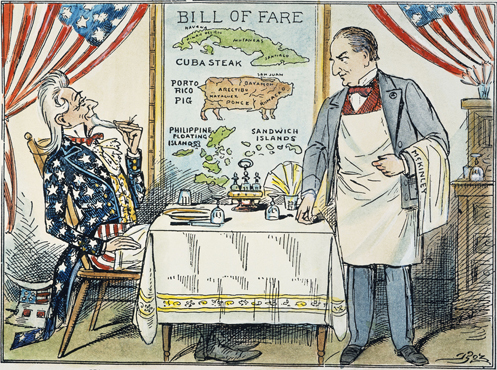 |
| Platt Amendment |
The United States occupied Cuba in 1898 and passed the Platt Amendment in 1901. A condition for ending the U.S. occupation of Cuba was the inclusion of an amendment that made Cuba a protectorate of the United States.
Although the Cuban constitutional convention delegates opposed the inclusion of the amendment, the United States was adamant, and it had armed forces on Cuba and warships available offshore. Given the choice between limited independence and no independence at all, Cuba accepted the Platt Amendment.
Senator Orville Platt (1827–1905) of Connecticut, a pro-U.S. nationalist expansionist who advocated high protective tariffs and helped to annex Hawaii and occupy the Philippines, authored the Platt Amendment, which was the brainchild of Secretary of State Elihu Root.
  |
The Platt Amendment was a rider to the Army Appropriations Bill of 1901. It provided that Cuba must have U.S. consent for all Cuban trade agreements and treaties with any other nation. It also gave the United States the right to intervene in Cuban affairs to preserve Cuban independence and maintain a government sufficient to preserve life, liberty, and property.
It remained in effect until abrogated in 1934. As well as stipulating the terms under which the United States could intervene in Cuban affairs, the amendment also authorized U.S. lease of land for a naval base and prohibited Cuban transfer of land to any other nation. The amendment made Cuba a virtual U.S. protectorate.
The Teller Amendment of 1898 had stated that the United States did not intend to annex Cuba after the Spanish-American War. U.S expansionists worried that German expansionists might seize the opportunity to harm U.S. interests by filling the void left by U.S. disinterest in the area.
The Platt Amendment compromised between outright imperialism and the repudiation of the Teller Amendment. The compromise prevented Cuba from making treaties, assuming debt, or stopping the U.S. sanitation program on the island.
It guaranteed the United States the right to intervene in Cuban affairs whenever the United States deemed U.S. interests were at stake. Additionally, because the United States had sought to control Guantánamo Bay, Cuba's best harbor, since 1899, it allowed the United States to lease sites for naval and coaling stations.
Thomas Estrada Palma, an advocate of the annexation of Cuba to the United States, took power in a 1902 Cuban election characterized by fraud and abuse of his position. Estrada Palma's term expired in 1905, but he attempted to return to power.
Rebels dissatisfied with the Cuban government and the U.S. involvement in Cuba resisted Estrada Palma. To thwart the liberal revolt, Theodore Roosevelt sent in troops on September 29, 1906. The revolt ended in a negotiated peace and reoccupation of Cuba.
The United States occupied Cuba militarily in 1906 under the terms of the Platt Agreement, remaining there for three years. The United States removed Cubans from government during its occupation. U.S. forces left in 1909 but returned in 1912. Another occupation lasted from 1917 until 1933.
Throughout the life of the Platt Amendment, in the interest of maintaining Cuban stability the United States refused to recognize any revolutionary government and sent warships to Cuban waters as necessary.
In 1934 circumstances had changed. Cuban nationalism was rising, and Cubans were increasingly critical of the U.S. dominance of their society. The United States was preoccupied with the Great Depression. In addition, Franklin Roosevelt had instituted a Good Neighbor Policy toward Latin America. Thus, the United States and Cuba signed a treaty abrogating the Platt Amendment. However, the United States retained its naval base at Guantánamo.